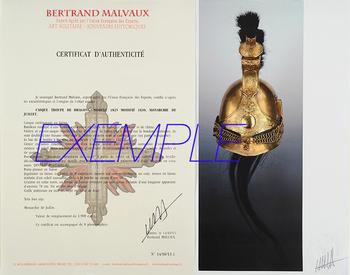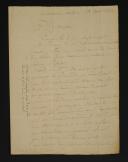
LETTER FROM PIERRE ROMAN, a prisoner at Norman Cross in England, ADDRESSED TO MAYOR OF MARSEILLE ANTOINE** (Anthoine) on April 10, 1813. 18910-18
Sold out
LETTER FROM PIERRE ROMAN, a prisoner at Norman Cross in England, ADDRESSED TO MAYOR OF MARSEILLE ANTOINE on April 10, 1813. 18910-18
Touching letter with address:
"To Mr. ANTOINE, Mayor, Officer and Treasurer of the Legion of Honor, Baron of St. Joseph / In Marseille / Bouches du Rhône Department in France." Postal marking over the address.
Pierre ROMAN writes on April 10, 1813, as a last resort, to the mayor of Marseille, ANTOINE, as he has been a prisoner of war for eight years at Norman Cross, a prison in England, and has had no response to the many letters he has sent to his parents. He wishes to know if they are still alive.
"Guided by the deepest respect, I have the honor of addressing your esteemed person to implore you in the name of humanity to consider my unfortunate situation.
This is the 8th year that I have been a prisoner of war. Since that time, I have written about twenty letters to my father and mother, André ROMAN, residing in the Roman quarter of your city, without the sweet consolation of receiving news from them. I kindly ask you, sir, to please inform me without any disguise if they are still in this world, and honor me with a word of response on this matter. So that your letter reaches me, I ask you to write to me in an envelope addressed to the director of the post office in Morlaix, seal the envelope and not my letter, which will be addressed to me. And frank it to Morlaix [...]
Signed: Pierre ROMAN, soldier of the 37th line regiment, prisoner of war at Norman Cross in England."
Handwritten note across the first page: "They were called twice, they refused to show up."
Double sheet. 1 1/2 pages of writing. H 25 cm x 18.5 cm.
Good condition, fold marks, damp stains in lower right corners.
* Norman Cross Prison was a former British prisoner of war camp established in 1796 to intern prisoners from the wars against France during the French Revolution and the First Empire. Located in Norman Cross, near Peterborough in Cambridgeshire, East England, it was the first purpose-built prisoner camp. It housed 7,000 French soldiers between 1797 and 1814, of whom 1,770 died on site. It featured innovations for the time: barracks, a school, a hospital, a market to sell crafts made by the prisoners, and a banking service. A British charity organization, the Nene Park Trust, acquired the site in 2025 to rehabilitate it and open it to the public.
** François Anthoine, Baron of Saint-Joseph, born in Marseille in 1787, a French military man, died in Marseille on March 12, 1866.
Mayor of Marseille, he volunteered in 1804 with the 1st regiment of dragoons and then attended the special military school in Fontainebleau, where he received the rank of second lieutenant in the 23rd horse chasseurs. Serving as aide-de-camp to Marshal Soult in 1807, he fought in the Battle of Friedland and then was sent on a mission to Saint Petersburg.
[...] Upon his return to France, he accompanied the marshal to Spain and Portugal and was captured at the Alhambra in Granada. Exchanged in 1809 through the efforts of Marshal Suchet, his brother-in-law, Saint-Joseph went to Holland as a captain in the 8th hussars and returned to Spain, serving as aide-de-camp to Suchet and participating in the campaigns of 1811, 1812, and 1813. [...]
Touching letter with address:
"To Mr. ANTOINE, Mayor, Officer and Treasurer of the Legion of Honor, Baron of St. Joseph / In Marseille / Bouches du Rhône Department in France." Postal marking over the address.
Pierre ROMAN writes on April 10, 1813, as a last resort, to the mayor of Marseille, ANTOINE, as he has been a prisoner of war for eight years at Norman Cross, a prison in England, and has had no response to the many letters he has sent to his parents. He wishes to know if they are still alive.
"Guided by the deepest respect, I have the honor of addressing your esteemed person to implore you in the name of humanity to consider my unfortunate situation.
This is the 8th year that I have been a prisoner of war. Since that time, I have written about twenty letters to my father and mother, André ROMAN, residing in the Roman quarter of your city, without the sweet consolation of receiving news from them. I kindly ask you, sir, to please inform me without any disguise if they are still in this world, and honor me with a word of response on this matter. So that your letter reaches me, I ask you to write to me in an envelope addressed to the director of the post office in Morlaix, seal the envelope and not my letter, which will be addressed to me. And frank it to Morlaix [...]
Signed: Pierre ROMAN, soldier of the 37th line regiment, prisoner of war at Norman Cross in England."
Handwritten note across the first page: "They were called twice, they refused to show up."
Double sheet. 1 1/2 pages of writing. H 25 cm x 18.5 cm.
Good condition, fold marks, damp stains in lower right corners.
* Norman Cross Prison was a former British prisoner of war camp established in 1796 to intern prisoners from the wars against France during the French Revolution and the First Empire. Located in Norman Cross, near Peterborough in Cambridgeshire, East England, it was the first purpose-built prisoner camp. It housed 7,000 French soldiers between 1797 and 1814, of whom 1,770 died on site. It featured innovations for the time: barracks, a school, a hospital, a market to sell crafts made by the prisoners, and a banking service. A British charity organization, the Nene Park Trust, acquired the site in 2025 to rehabilitate it and open it to the public.
** François Anthoine, Baron of Saint-Joseph, born in Marseille in 1787, a French military man, died in Marseille on March 12, 1866.
Mayor of Marseille, he volunteered in 1804 with the 1st regiment of dragoons and then attended the special military school in Fontainebleau, where he received the rank of second lieutenant in the 23rd horse chasseurs. Serving as aide-de-camp to Marshal Soult in 1807, he fought in the Battle of Friedland and then was sent on a mission to Saint Petersburg.
[...] Upon his return to France, he accompanied the marshal to Spain and Portugal and was captured at the Alhambra in Granada. Exchanged in 1809 through the efforts of Marshal Suchet, his brother-in-law, Saint-Joseph went to Holland as a captain in the 8th hussars and returned to Spain, serving as aide-de-camp to Suchet and participating in the campaigns of 1811, 1812, and 1813. [...]
Reference :
18910-18

Next update Friday, January 30 at 13:30 PM
FOR ALL PURCHASES, PAYMENT IN MULTIPLE CHECKS POSSIBLE
bertrand.malvaux@wanadoo.fr 06 07 75 74 63
SHIPPING COSTS
Shipping costs are calculated only once per order for one or more items, all shipments are sent via registered mail, as this is the only way to have proof of dispatch and receipt.
For parcels whose value cannot be insured by the Post, shipments are entrusted to DHL or Fedex with real value insured, the service is of high quality but the cost is higher.
RETURN POLICY
Items can be returned within 8 days of receipt. They must be returned by registered mail at the sender's expense, in their original packaging, and in their original condition.
AUTHENTICITY
The selection of items offered on this site allows me to guarantee the authenticity of each piece described here, all items offered are guaranteed to be period and authentic, unless otherwise noted or restricted in the description.
An authenticity certificate of the item including the description published on the site, the period, the sale price, accompanied by one or more color photographs is automatically provided for any item priced over 130 euros. Below this price, each certificate is charged 5 euros.
Only items sold by me are subject to an authenticity certificate, I do not provide any expert reports for items sold by third parties (colleagues or collectors).
FOR ALL PURCHASES, PAYMENT IN MULTIPLE CHECKS POSSIBLE
bertrand.malvaux@wanadoo.fr 06 07 75 74 63
An authenticity certificate of the item including the description published on the site, the period, the sale price, accompanied by one or more color photographs is automatically provided for any item priced over 130 euros. Below this price, each certificate is charged 5 euros.
Only items sold by me are subject to an authenticity certificate, I do not provide any expert reports for items sold by third parties (colleagues or collectors).

